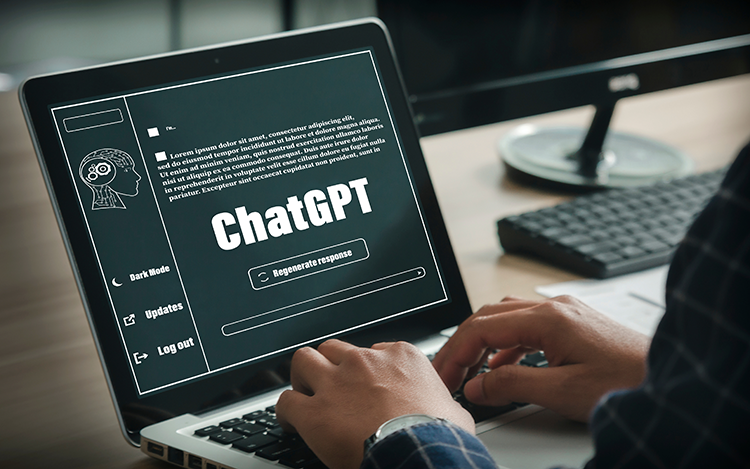Can ChatGPT help law students learn to write better?

Image from Shutterstock.
ChatGPT, an artificial intelligence chatbot that can speak and write like humans, can be weak on facts but may already be a better wordsmith than some attorneys, according to David Kemp, an adjunct professor at Rutgers Law School.
“If you’re asking it to organize several concepts, or are struggling to explain something in a way that’s really understandable, it can help,” says Kemp, who also is the managing editor of Oyez, a multimedia website focused on opinions from the U.S. Supreme Court.
The technology, created by the research lab OpenAI, seems to prefer active voice, as does Kemp. He introduced ChatGPT in an advanced legal writing class and plans to include it in a summer course about emerging technology.
 David Kemp is an adjunct professor at Rutgers Law School.
David Kemp is an adjunct professor at Rutgers Law School.
Various law schools are following suit. Legal writing faculty interviewed by the ABA Journal agree that ChatGPT writing can model good sentence structure and paragraph structure. However, some fear that it could detract from students learning good writing skills.
“If students do not know how to produce their own well-written analysis, they will not pass the bar exam,” says April Dawson, a professor and associate dean of technology and innovation at the North Carolina Central University School of Law.
Additionally, using tools such as ChatGPT for graded assessment assignments may be an ethical violation if students are not producing their own work, Dawson adds.
Regarding the accuracy issue, some academics think that ChatGPT could get better with time.
“It doesn’t have access to legal research platforms at the moment, like LexisNexis and Westlaw, so it doesn’t know caselaw that only exists in those databases,” says Ashley Armstrong, an assistant clinical professor at the University of Connecticut School of Law.
She wrote an academic paper, titled “Who’s Afraid of ChatGPT? An Examination of ChatGPT’s Implications for Legal Writing.” Armstrong’s research includes asking for a series of legal research and writing tasks, and she says some of the responses were impressive.
For instance, her paper noted that ChatGPT was able to indentify “logical flaws” in contract clauses. Additionally, she wrote, it did a “pretty good job” summarizing facts and wrote text that sounded lawyerly.
However, accuracy was an issue, including answers for questions that she submitted about Connecticut’s Recreational Land Use Statute.
“I asked it to give me 10 cases I should look into. It did, all of which don’t exist,” says Armstrong, who used LexisNexis and Westlaw to check the cites provided.
Dyane O’Leary, an associate professor of legal writing at the Suffolk University Law School, recently assigned students in an upper-division practice skills class to draft a law clerk email advising a judge whether a motion should be granted. In class, after students did their research, they prompted the same legal question into ChatGPT and evaluated whether responses were reliable research.
“A student noted that the ChatGPT answers were great at fluff,” says O’Leary, who heads the law school’s legal innovation and technology concentration.
“As a class, we discussed that it had a lot of words in the right ballpark, but on this particular prompt, the answer was wrong,” she explains, referring to legal terms.
At the Northwestern University Pritzker School of Law, Daniel Linna Jr. assigned students in his class focused on the law of AI and robotics to sign up for ChatGPT, try it out and share their thoughts on the discussion board.
“Almost everyone recognized it’s bad with facts but really good at writing prose,” says Linna, a senior lecturer.
He also has a joint appointment as director of law and technology at the law school and the university’s Robert R. McCormick School of Engineering and Applied Science.
A former equity partner at Honigman Miller Schwartz and Cohn, Linna says law firms already use tools powered by technology similar to ChatGPT.
“I have no doubt that lawyers who use these tools are drafting better contracts,” says Linna, who is also an affiliated faculty member at CodeX: The Stanford Center for Legal Informatics. “As we improve the tools, they will help us write better contracts faster. It’s not just about efficiency; it’s about drafting terms that improve the speed of getting the deal done, which adds value for clients.”
See also:
ABAJournal.com: “Should lawyers embrace or fear ChatGPT?”
ABAJournal.com: “Does ChatGPT produce fishy briefs?”
ABAJournal.com: “The Case for ChatGPT: Why lawyers should embrace AI”
ABAJournal.com: “Meet Harvey, BigLaw firm’s artificial intelligence platform based on ChatGPT”
Write a letter to the editor, share a story tip or update, or report an error.



